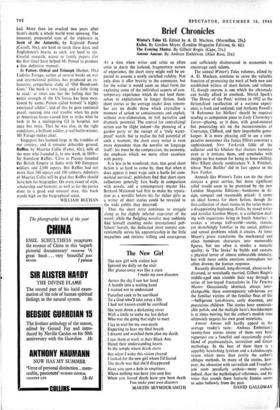Brief Chronicles
Winter's Tales 12. Edited by A. D. Maclean. (Macmillan, 25s.) Exiles. By Gordon Meyer. (London Magazine Editions, 6s. 6d.) The Fencing Master. By Gilbert Rogin. (Cape, 21s.) Amour Amour. By Andreas Embiricos. (Alan Ross, 21s.)
AT a time when writer and critic so often unite to decry the isolated, fragmentary nature of experience, the short story might well be ex- pected to assume a newly enriched validity. Not only does it offer brevity to the commuter, but for the writer it would seem an ideal form for exploring some of the individual aspects of con- temporary experience which do not lend them- selves to exploitation in longer fiction. Such short stories as the average reader does remem- ber are no doubt those which crystallise a moment of action or consciousness and exploit, without over-elaboration, its full narrative and dramatic potential. The central (or centralising) action can be slight indeed—the planning of a garden party or the receipt of a 'truly water- proof watch; but to realise the full potential of such a moment, the short story writer is even more dependent than the novelist on language itself : his must be the compression, the economy, the emphasis which we more often associate with poetry.
It is less to be wondered, then, that good short fiction is so hard to come by, than that when it does appear it must wage such a battle for com- mercial survival : publishers find that short story collections generally fare badly in comparison with novels, and a contemporary master like Bernard Malamud had first to make his reputa- tion as a novelist before his far richer gifts as a writer of short stories could be revealed to the wide public they deserved.
Thus the short story continues to struggle along as the slightly inferior step-sister of the novel; while the fledgling novelist may suddenly find himself standing midst international pub- lishers' laurels, the dedicated short storyist con- ventionally serves his apprenticeship in the little magazines and reviews willing and courageous and sufficiently disinterested in economics to encourage such talents.
The annual Winter's Tales volumes, edited by A. D. Maclean, continue to serve the valuable function of promoting the work of both new and established writers of short fiction, and volume 12, though uneven, is one which the aficionado can hardly afford to overlook. Muriel Spark's `The House of the Poet,' written in 1952 as the fictionalised recollection of a wartime experi- ence, is fresh and undated; and Anthony Powell's 'A Reference for Mellors' should be required reading as companion piece to Lady Chatterley's Lover—playing, as it does, with good-natured but penetrating wit on the inconsistencies of Constance, Clifford, and their improbable game- keeper. It is more pleasing still to see a com- parative newcomer like Janice Elliott construct a sophisticated, New Yorkerish fable of the collector and his bibelots that shatters formulas even as it imitates them, and concludes with insight no less human for being so bone-chilling; Miss Elliott clearly outdistances V. S. Pritchett, whose 'Nest Builder' did in fact appear in the New Yorker.
Annuals like Winter's Tales can do the short storyist a great service, but more significant relief would seem to be promised by the new London Magazine Editions—handsome in de- sign, compact and reasonably priced : it seems an ideal format for short fiction, though the first collection of short stories in the series makes a disappointing beginning. Exiles, by travel writer and novelist Gordon Meyer, is a collection deal- ing with expatriates living in South America : it evokes a strange half-world—exotic, remote, yet disturbingly familiar in the social, political and sexual problems which it creates. At times Meyer's prose transforms the mechanical and often humdrum characters into memorable figures, but too often it exudes a narcotic quality; in 'The Snake' he builds and sustains a physical terror of almost unbearable intensity, but with more subtle emotions atmosphere too often drowns the human response.
Recently divorced, long-divorced, about-to-be- divorced, or wretchedly married, Gilbert Rogin's middle-aged men stumble their way through a series of low-keyed frustrations in The Fencing Master. Occasionally identical, always inter- changeable, these contemporary sub-heroes are the familiar victims of the familiar fleas of life —belligerent taxi-drivers, surly doormen, and precocious children. The stories have unmistak- able polish, and the multiple hero's bewilderment is at times moving, but the author's modish tone ultimately negates his own good intentions.
Amour Amour will hardly appeal to the average reader's taste: Andreas Embiricos's twenty-four stories (many of them very brief vignettes) are a fanciful and occasionally erotic blend of psychoanalysis, surrealism and Greek mythology. In the best of them there is a superbly bewitching lyricism and a kaleidoscopic vision which more than justify the author's oblique methods. In many of the stories, how- ever, the obsession with surrealism and Freudian- ism seem peculiarly archaic—more archaic, indeed, than the mythological references, and the voice that sounds these fantastic litanies seems to echo hollowly from the past. DAVID GALLOWAY






























 Previous page
Previous page